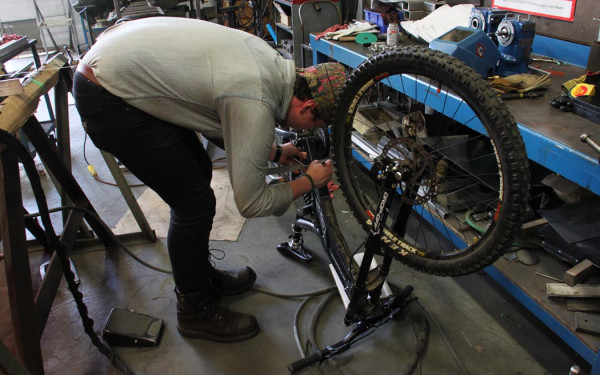On Time on Two Wheels
How our Bike City Can Fix its Business Model
Whether you like it or not, cycling is fully engrained into the culture of this strange city. Every spring, thousands of rickety bi-wheeled wonders flood the streets as Montrealers take their bought, borrowed or rented whips out for a spin.
Whether you like it or not, cycling is fully engrained into the culture of this strange city.
Every spring, thousands of rickety bi-wheeled wonders flood the streets as Montrealers take their bought, borrowed or rented whips out for a spin.
Over the last 15 years, bike trends have changed dramatically in Montreal and in Quebec. According to Transport Canada, one in six adults were using bicycles as their means of transportation in 2005, and those numbers have continued to rise.
Of course, none of this is by accident. Montreal and its transportation industry, along with groups like Velo Montreal, have been making real efforts to improve the city’s transportation image over the last decade.
During the Montreal Summit of 2002, the city decided that transportation was a key component to the first strategic plan for sustainable development. A large part of that plan involved active transportation and a greater focus on the city’s booming cycle culture.
Some people took full advantage of this boom and as a result, the bike messenger has become a well-known (though hotly contested) fixture of the urban Montreal environment.
Attaining the Unattainable
There are dozens of courier companies and a couple hundred bike messengers zipping through the streets of downtown Montreal. It’s no news that bikes are the fastest and most efficient way to navigate the congested city streets, yet some companies still rely on postal trucks and cars to do their deliveries. This is especially true once you leave the downtown core.
“Outside of a certain zone there are no bike messengers and there’s a reason for that: [bike messengers] are just more effective in maintaining the downtown customers,” said Cam Novak, owner and founder of Cycle-Bird Courier. “I saw this and didn’t really agree, so I decided to construct a company purely based around cycling.”
In the fall of 2008 Novak founded Cycle-Bird as a cycle-only sustainable alternative to the big courier companies that dominate Montreal. The company has strict rules on pollution and consumption, sends all its invoices electronically, and attempts to offset its waste by donations to a local not-for-profit.
“In an ideal world I’d like to have a business that creates zero pollution,” said Novak. “Of course that’s not entirely possible, but it’s about trying to attain the unattainable.”
Going the Distance
“Being a bike messenger is inherently sustainable, but it hasn’t typically been done for that reason,” said Kelly Pennington, Concordia urban planning student and one of five couriers at Cycle-Bird. “This job has been around long before it was a good business plan to seem sustainable.”
However, Pennington adds that for most companies, if the job seems faster or easier to do by car, it’s sent that way without hesitation.
“We’re really pushing the boundaries of what most people think is possible on a bike,” said Pennington.
Cycle-Bird boasts some impressive credentials, and the lengths at which this small crew goes to provide their speedy service is definitely something to make note of.
“I can send a biker from downtown to the end of the island in 30 minutes if I need to,” said Novak.
The company website lists long distance trips to Ottawa, Quebec City, and Kingston, while their delivery zone covers the entire island of Montreal, from tip to tip on two wheels.
As impressive as this service is, there is still a negative stigma that looms around the bike messenger.
“I don’t like it when people generalize, or when they think that I’m a scumbag because I ride a bike for a living,” said Novak. “But I don’t think that it’s the fault of the people doing the job; I think it’s the industry’s fault.”
An Industry in Disrepair
According to Novak, one of the biggest problems with the courier business is the treatment of its employees.
“It doesn’t take long to figure out that the industry itself is flawed,” said Novak. “There is no minimum wage, zero compensation if you get hurt, and no breaks. It’s an industry that is running wild and can do whatever it wants.”
Along with being one of the only companies to provide an island-wide bike messenger service, Cycle-Bird is also one of the only courier services to pay its employees a fixed daily pay, as opposed to the standard 50-60 per cent of a delivery.
Novak agrees that the percentage system creates incentive for workers, but thinks it fails by creating an unhealthy competition amongst couriers.
“[The percentage system] creates a situation where you’re constantly worrying about your pay check,” said Novak. “Sometimes a courier can make less than $40 in a day, sometimes you can make $100, but you just don’t know. That’s not something that I want my team feeling.”
Though it may be a work in progress, Novak believes that the industry itself needs a big change, and he’s willing to start it.
“One of my goals is not only to be sustainable in what we do day-to-day, but to be sustainable in the way we treat people,” he said.

1_900_600_90.jpg)
1_900_600_90.jpg)





